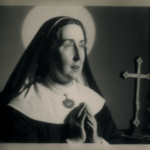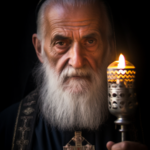St. Basil the Great
St. Basil the Great
When They Lived:
St. Basil the Great, also known as Basil of Caesarea, lived during the latter part of the 4th century. He was born around 329 AD and passed away on January 1, 379 AD.
Where They Lived:
Basil the Great spent the majority of his life in Caesarea, which was located in the Roman province of Cappadocia, in present-day Turkey. This region was renowned for its rich cultural and intellectual atmosphere.
Notable World Events During Their Life:
- Council of Nicaea (325 AD): Basil’s early years were marked by the aftermath of the First Council of Nicaea, where the nature of Christ’s divinity was debated and established as a foundational doctrine of Christianity.
- Death of Emperor Constantine the Great (337 AD): The passing of Emperor Constantine brought political changes to the Roman Empire, which had a lasting impact on the Christian Church’s relationship with the state.
- Fall of the Western Roman Empire (476 AD): Though after Basil’s time, the eventual fall of the Western Roman Empire marked a significant transition in the geopolitical landscape of Europe.
- Founding of Constantinople (330 AD): Emperor Constantine established Constantinople (modern-day Istanbul) as the new capital of the Roman Empire, altering the centers of power and influencing the spread of Christianity.
- Life of St. Augustine (354–430 AD): The life of Augustine of Hippo, a contemporaneous figure, was marked by his profound philosophical and theological writings, which significantly shaped Christian thought.
Their Patronage:
St. Basil the Great is celebrated as the patron saint of a wide range of causes and groups, making his influence remarkably diverse and enduring. His patronage includes:
- Hospital Administrators and Nurses: Basil’s efforts to care for the sick and destitute have linked him to those in the medical field, emphasizing the importance of compassion and care.
- Theologians and Scholars: Basil’s intellectual pursuits and profound theological contributions have made him a guiding figure for those who seek wisdom and understanding.
- Poverty Relief Organizations: His dedication to serving the less fortunate makes him a patron of charitable organizations, inspiring acts of kindness and generosity.
- Educators and Students: Basil’s establishment of the first organized Christian educational system highlights his influence on learning and the dissemination of knowledge.
- Monastics and Ascetics: Basil’s monastic writings and disciplined lifestyle have earned him the respect of those in the monastic and contemplative traditions.
- Cappadocia and Greece: He is also venerated as a patron of his homeland and its people.
Life and Legacy
Saint Basil The Great was born in the year 330 to a distinguished Christian Cappadocian Greek family known for their devotion. He was tutored formally and received extensive education in Caesarea Mazaca in Cappadocia where he became acquainted with Gregory of Nazianzus who would go on to become a revered Saint and a key player in Basil’s quest for Monasticism.
Basil the Great left for Constantinople to further his studies, where he once again met with Gregory and became fast friends with him. In 356, Basil traveled to Egypt and Syria, where he gained further extensive knowledge of law like his father, Basil the Elder. He was on his way to becoming a great scholar when things took a rather unexpected turn.
Basil’s legal learning was interrupted when he met Eustathius of Sebaste,who would become his mentor. He was so deeply influenced by their relationship that he abandoned his career as a legal orator and became a devout believer in God and religion.
The beginning of this Godly relationship marked a turning point for Basil. He began to travel far and wide through Palestine, Egypt, Syria, and Mesopotamia to study and begin his practice of monasticism and asceticism. He pursued theological missions, took solitude, and heeded the needs of the poor, distributing his riches amongst them.
While he remained dedicated to asceticism, he realized he was not one to live in solitude. He began to see the beauty in communal relationships and eventually realized he bore different convictions from his mentor,Gregory of Nazianzus.
By 358, Basil had departed from Gregory and began to gather disciples with whom he shared the same views. He went on to write about and teach monastic communal life. These early writings would make up the documents of Saint Basil’s legacy.
Just before being ordained Deacon in 362, Saint Basil attended the Council of Constantinople, where he renounced his alliance with the Homoiousians. He considered the Homoiousians’ semi-Arian views unacceptable and instead stood in support of the Nicene Creed.
Arianism threatened to tear the Christians of Cappadocia apart. Led by Emperor Valens, the Arian heresy interpreted Jesus as an entity that did not always exist as God. This explanation of Christ’s divinity was not accepted by the many Christian orthodox, causing Emperor Valens to persecute Christians who dared to speak against or debate this heresy.
Saint Basil continued to fight against the wild spread of Arianism even after being made Bishop in 370. Striking a perfect balance between political power and his religious beliefs, Basil was strict but always showed mercy on the needy. He built the Basiliad, which was a poorhouse, hospice, and hospital and is described as one of the greatest monuments in Christian history.
Saint Basil the Great continued to preach his belief that God the Father and Son are one. He continued his passionate quest against Arianism, prayed tirelessly, and reformed prostitutes and thieves until his death.
Works
Saint Basil the Great wrote several books and documented several real-life accounts that would stand as a legacy. Among these letters, valuable books on history and teachings have appeared in the 20th century. Some of Saint Basil’s works include the Sermon to the Lazicians, Moralia, and Asketika.
Saint Basil has a strong influence on Christian Liturgy. He is also mentioned and preserved in specific prayers, like the litany of saints used for exorcism.
5 Interesting Facts About St. Basil the Great
- Did you know Saint Basil is the patron saint of Turkey? He is the
patron saint for the region of Cappadocia, where he originated from. - Did you know that Saint Basil is buried in Saint George’s Cathedral?
in Istanbul, Turkey? Before being renamed, Istanbul was called
Constantinople. - Did you know that Saint Basil’s modern place of birth is Kayseri?
Turkey? Keysari is the modern-day Ceaserea Mazaca. - Did you know that Saint Basil had nine siblings, four of whom are
venerated saints like him? These are Macrina the Younger,
Naucratius, Peter of Sebaste, and Gregory of Nyssa - Did you know that Basil the Great’s books still guide monks today?
today? Some of his books, like Moralia, act as ethical manuals.
for monks.
Prayer to St. Basil the Great
Saint Basil, o great follower of God, help all as well as me. Defender of orthodoxy, defend us too, that follow your faith and stand beside you. Great follower of God, pray to him for all your people, as well as for unworthy me. Strong knight and leader of Ostrog, save us from the seen and unseen. Raised on Serbian soil, be the light in front of God, be our light, light up our road, and make darkness disappear. With prayer and tears, you have warmed the cold cliffs of Ostrog; please warm our hearts with God’s spirit so we can be saved. From all corners of the world to your grave came the weak and the ill, and you helped them, got rid of their demons as well as the devil, and healed their souls and bodies. Please continue to help the baptized and the non-baptized, everybody, and me as well. You brought peace to fighting brothers; please continue to bring peace, help the divided, make the sad happy, calm the stubborn, and heal the sick. Saint Basil, miracle worker, father of our spirits, listen and hear your children’s spirits in the name of Jesus Christ.



